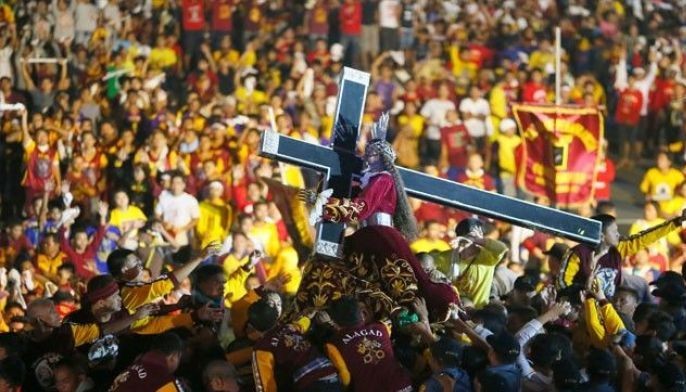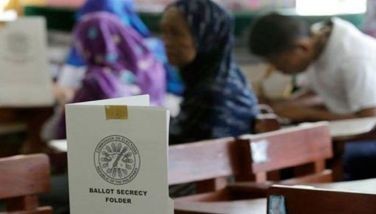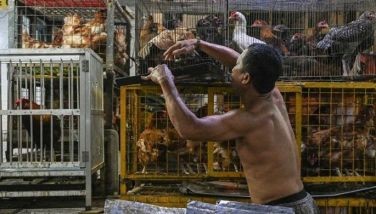Most Pinoys trust Comelec but not Abalos
May 6, 2004 | 12:00am
The public generally trusts the Commission on Elections, it’s the Comelec chairman they don’t quite trust.
A 60 percent majority of registered voters trust the Comelec as an institution, but only 26 percent trust Comelec Chairman Benjamin Abalos himself, according to the Social Weather Stations (SWS) national surveys conducted on March 21-29 and April 10-17.
The March survey found that 15 percent of survey respondents distrust the Comelec, giving the poll body a net trust rating of 44.
The remaining 25 percent of respondents remained neutral by being neither trustful nor distrustful of the Comelec.
The April survey found 35 percent of respondents distrust Abalos, giving him a poor net trust rating of -10, as regard for Abalos decreased since February 2004, when trust in him was pegged at 35 percent as against 31 percent who distrusted him, placing his net trust rating at 4.
The Comelec’s net rating of 49 in February and 45 in January of this year shows consistently better trust scores now than in previous SWS surveys going as far back as 1991.
The March 2004 survey found public trust in Comelec as positive in all major areas and social classes, except that Metro Manila residents and the middle-to-upper classes are well below average.
On the other hand, the April 2004 survey found public trust in Abalos as negative in all major areas and classes.
Both the March 21-29 and the April 10-17 surveys used face-to-face interviews of a statistically representative national sample of 1,400 respondents, with quotas of 300 in Metro Manila, 250 in Luzon North of Metro Manila, 250 in Luzon South of Metro Manila, 300 in the Visayas, and 300 in Mindanao. The error margin for national figures is three percent.
Abalos’ predecessor, Alfredo Benipayo, also fared poorly in surveys, with net satisfaction of -14 in June 2002 and 3 in July 2001 and net trust of -4 in March 2001.
Former Comelec chairwoman Harriet Demetriou enjoyed generally favorable net satisfaction ratings at 36 in March 1999, 21 in October 2000 and 16 in December 2000.
On the other hand, the net ratings of Demetriou’s predecessor, Bernardo Pardo, in seven SWS surveys during 1995-98 were mediocre, from a low of -4 to a high of only 18.
Former Comelec chairman Christian Monsod did consistently well in the surveys, with net satisfaction of 32 in April 1992 and 33 in December 1994.
SWS said that, over the years, its survey items on the Comelec and its chairmen have been included on SWS’ initiative, and have not been sponsored by anyone.
Number Of ‘Tactical Voters’ Doubles
Meanwhile, the number of ‘tactical voters’ — people who would vote to help defeat a candidate they dislike in case their first choice of candidate is unlikely to win — doubled to 20 percent of the electorate, a separate SWS survey showed.
The April 10-17 SWS survey of "1,400 statistically representative likely voters" showed that the number of tactical voters has grown from 10 percent in 1998 to 20 percent this year.
The survey asked whether or not the respondents would "vote for another candidate to help defeat a candidate I dislike" if the candidate they like best is not too popular.
In this survey, 80 percent of respondents said they would "vote for the candidate with views closest to mine," whether or not that candidate is popular.
The same survey question showed that 16 percent of respondents would cast tactical votes when it was asked in January, SWS said in a statement uploaded on the SWS website www.sws.org.ph.
The January survey showed a three percent increase in the number of tactical voters from the April 2001 survey preceding the last senatorial and local elections.
The survey also found tactical voters were more common in the Visayas (28 percent) and least common in Metro Manila (12 percent) and southern Luzon (12 percent).
Tactical voting is slightly above average in Mindanao (22 percent) and northern Luzon (24 percent), the SWS survey found.
The survey found that tactical voting is more common among the lower classes than the upper classes, with 22 percent of class E, 19 percent of Class D and 18 percent of the middle-to-upper classes saying they would vote tactically.
People who have had more schooling are also less likely to cast tactical votes, with 32 percent of non-elementary school graduates, 29 percent of those who completed elementary, 18 percent who studied or finished high school, 14 percent of those who took college or vocational courses and nine percent of college graduates saying they would vote tactically.
The April survey also found that the likeliest tactical voters are those who support the presidential bid of Koalisyon ng Nagkakakisang Pilipino (KNP) presidential candidate Fernando Poe Jr. and the least number of potential tactical voters support the candidacy of Alyansa ng Pag-asa candidate Raul Roco. Some 25 percent of pro-Poe respondents said they would vote tactically, as compared with only 10 percent of Roco supporters.
Tactical voting is close to average among those who support Bangon Pilipinas Movement (BPM) standard-bearer Eddie Villanueva (20 percent), President Arroyo (20 percent) and independent presidential candidate Sen. Panfilo Lacson (19 percent).
In a related development, the SWS reported that 46 percent of registered voters nationwide agree that there should be international observers present during the May 10 polls, while 36 percent disagree and 18 percent are undecided, according to the March 21-29 survey by SWS.
The survey found majority support for having international observers monitor the elections among respondents from the National Capital Region (56 percent agree) and middle-to-upper classes (57 percent).
There is plurality agreement in the rest of Luzon (46 percent) for allowing international poll observers to monitor the elections, while opinions are split in the Visayas, Mindanao, and classes D and E.
The items described in the SWS survey regarding international poll observers were not commissioned, but were included on SWS’ own initiative.
"(These) surveys are supported by subscribers, who have no proprietary rights over the data," the SWS said.
The latest data from the (Comelec) show there are 43,536,028 registered voters for the May 10 polls, up by 5.8 million or 15 percent since the July 2002 barangay elections, which listed a roster of 37,778,579 registered voters.
A 60 percent majority of registered voters trust the Comelec as an institution, but only 26 percent trust Comelec Chairman Benjamin Abalos himself, according to the Social Weather Stations (SWS) national surveys conducted on March 21-29 and April 10-17.
The March survey found that 15 percent of survey respondents distrust the Comelec, giving the poll body a net trust rating of 44.
The remaining 25 percent of respondents remained neutral by being neither trustful nor distrustful of the Comelec.
The April survey found 35 percent of respondents distrust Abalos, giving him a poor net trust rating of -10, as regard for Abalos decreased since February 2004, when trust in him was pegged at 35 percent as against 31 percent who distrusted him, placing his net trust rating at 4.
The Comelec’s net rating of 49 in February and 45 in January of this year shows consistently better trust scores now than in previous SWS surveys going as far back as 1991.
The March 2004 survey found public trust in Comelec as positive in all major areas and social classes, except that Metro Manila residents and the middle-to-upper classes are well below average.
On the other hand, the April 2004 survey found public trust in Abalos as negative in all major areas and classes.
Both the March 21-29 and the April 10-17 surveys used face-to-face interviews of a statistically representative national sample of 1,400 respondents, with quotas of 300 in Metro Manila, 250 in Luzon North of Metro Manila, 250 in Luzon South of Metro Manila, 300 in the Visayas, and 300 in Mindanao. The error margin for national figures is three percent.
Abalos’ predecessor, Alfredo Benipayo, also fared poorly in surveys, with net satisfaction of -14 in June 2002 and 3 in July 2001 and net trust of -4 in March 2001.
Former Comelec chairwoman Harriet Demetriou enjoyed generally favorable net satisfaction ratings at 36 in March 1999, 21 in October 2000 and 16 in December 2000.
On the other hand, the net ratings of Demetriou’s predecessor, Bernardo Pardo, in seven SWS surveys during 1995-98 were mediocre, from a low of -4 to a high of only 18.
Former Comelec chairman Christian Monsod did consistently well in the surveys, with net satisfaction of 32 in April 1992 and 33 in December 1994.
SWS said that, over the years, its survey items on the Comelec and its chairmen have been included on SWS’ initiative, and have not been sponsored by anyone.
Meanwhile, the number of ‘tactical voters’ — people who would vote to help defeat a candidate they dislike in case their first choice of candidate is unlikely to win — doubled to 20 percent of the electorate, a separate SWS survey showed.
The April 10-17 SWS survey of "1,400 statistically representative likely voters" showed that the number of tactical voters has grown from 10 percent in 1998 to 20 percent this year.
The survey asked whether or not the respondents would "vote for another candidate to help defeat a candidate I dislike" if the candidate they like best is not too popular.
In this survey, 80 percent of respondents said they would "vote for the candidate with views closest to mine," whether or not that candidate is popular.
The same survey question showed that 16 percent of respondents would cast tactical votes when it was asked in January, SWS said in a statement uploaded on the SWS website www.sws.org.ph.
The January survey showed a three percent increase in the number of tactical voters from the April 2001 survey preceding the last senatorial and local elections.
The survey also found tactical voters were more common in the Visayas (28 percent) and least common in Metro Manila (12 percent) and southern Luzon (12 percent).
Tactical voting is slightly above average in Mindanao (22 percent) and northern Luzon (24 percent), the SWS survey found.
The survey found that tactical voting is more common among the lower classes than the upper classes, with 22 percent of class E, 19 percent of Class D and 18 percent of the middle-to-upper classes saying they would vote tactically.
People who have had more schooling are also less likely to cast tactical votes, with 32 percent of non-elementary school graduates, 29 percent of those who completed elementary, 18 percent who studied or finished high school, 14 percent of those who took college or vocational courses and nine percent of college graduates saying they would vote tactically.
The April survey also found that the likeliest tactical voters are those who support the presidential bid of Koalisyon ng Nagkakakisang Pilipino (KNP) presidential candidate Fernando Poe Jr. and the least number of potential tactical voters support the candidacy of Alyansa ng Pag-asa candidate Raul Roco. Some 25 percent of pro-Poe respondents said they would vote tactically, as compared with only 10 percent of Roco supporters.
Tactical voting is close to average among those who support Bangon Pilipinas Movement (BPM) standard-bearer Eddie Villanueva (20 percent), President Arroyo (20 percent) and independent presidential candidate Sen. Panfilo Lacson (19 percent).
The survey found majority support for having international observers monitor the elections among respondents from the National Capital Region (56 percent agree) and middle-to-upper classes (57 percent).
There is plurality agreement in the rest of Luzon (46 percent) for allowing international poll observers to monitor the elections, while opinions are split in the Visayas, Mindanao, and classes D and E.
The items described in the SWS survey regarding international poll observers were not commissioned, but were included on SWS’ own initiative.
"(These) surveys are supported by subscribers, who have no proprietary rights over the data," the SWS said.
The latest data from the (Comelec) show there are 43,536,028 registered voters for the May 10 polls, up by 5.8 million or 15 percent since the July 2002 barangay elections, which listed a roster of 37,778,579 registered voters.
BrandSpace Articles
<
>
- Latest
- Trending
Trending
Latest
Trending
Latest
Recommended

































